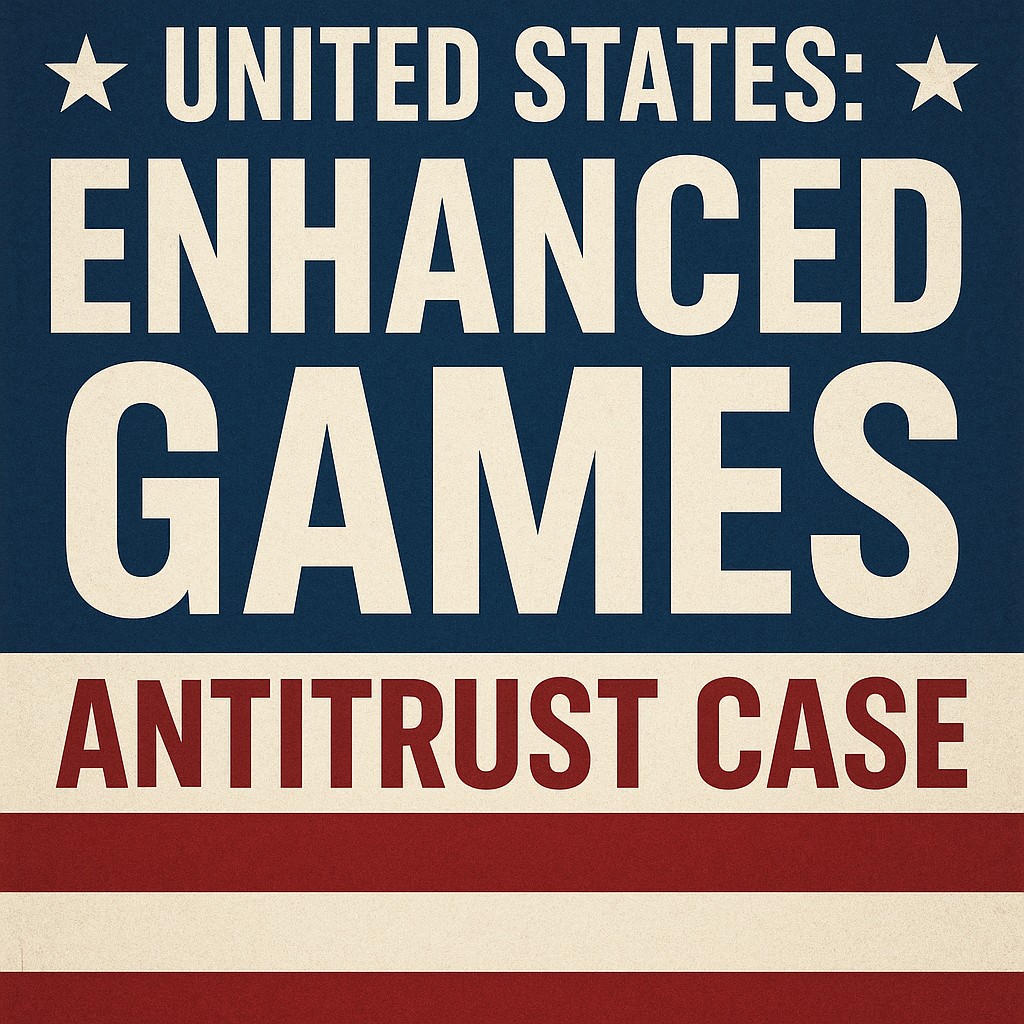UNITED STATES: ENHANCED GAMES ANTITRUST CASE

On 27 August 2025, Enhanced Games has announced on its official website that it had filed an antitrust complaint before the United States District Court for the Southern District of New York against World Aquatics, USA Swimming, and the World Anti-Doping Agency (WADA).
The Enhanced Games were launched as a concept in 2023, and allow, under medical supervision, the use of certain performance enhancing drugs, that are approved by the United States’ Food and Drug Administration (FDA), in their competitions, which include swimming.
The US legal proceedings directly challenge By-law 10, recently published on the World Aquatics website, which introduces new rules of ineligibility for athletes and support staff associated with competitions that embrace “scientific enhancements that include the use of Prohibited Substances or Prohibited Methods (as those terms are defined in the Doping Control Rules) and/or the use of any illegal drug.”
The complaint, grounded in Sections 1 and 2 of the Sherman Act 1890, alleges a coordinated effort to prevent participation in the Enhanced Games. At issue is whether the contested measures amount to an unlawful foreclosure of competition in the international elite swimming market.
The complainant is seeking US$200 million (around Sw. Frs. 159.3 million) in actual damages, to be trebled to USD 800 million (around Sw. Frs. 640.2 million), together with punitive damages and the recovery of attorneys’ fees, as well as injunctive relief aimed at restraining what it alleges is the defendants’ unlawful campaign and suspending the application of By-law 10.
By-law 10 declares ineligible any individual who participates in, supports, or even endorses a competition that embraces “scientific enhancements”, regardless of any proven violation of the World Anti-Doping Code. Its scope extends beyond athletes to include coaches, doctors, physiotherapists and officials. World Aquatics has explained that this measure is intended to uphold Olympic values; safeguard health and safety; and protect the integrity and reputation of aquatic sports.
The complainant, for its part, presents a different vision of elite sport. Its model places strong emphasis on athlete welfare, financial recognition, and independence from public funding. According to its published materials, all competitors undergo comprehensive medical profiling — including cardiac and brain imaging, biomarker analysis, musculoskeletal assessments, and genomic sequencing — to ensure eligibility and detect potential risks.
The complainant further emphasises its policy of providing some of the highest athlete payouts, combining appearance fees, performance-based bonuses, and record-breaking rewards. In presenting itself as aspiring to a global benchmark in athlete medical assessment, it seeks to unite technological innovation with meaningful financial recognition. Its events are also described as fully privately funded, supported by leading venture capital investors, which, in its view, ensures independence from public subsidies and taxpayer resources. According to its official announcements, the first Enhanced Games will take place at Resorts World, Las Vegas, Nevada, from 21 to 24 May 2026, featuring swimming (50m and 100m freestyle; 50m and 100m butterfly); track and field (100m sprint; 100m/110m hurdles); and weightlifting (snatch; clean & jerk).
This broader vision already has practical consequences. British swimmer Ben Proud, Olympic silver medallist and world champion, has announced that he will join the Enhanced Games. Whilst World Aquatics and UK Sport have expressed strong opposition, the latter even reviewing his eligibility for public funding, Proud has emphasised that participation will take place under strict medical supervision and does not, in his view, undermine the principles of clean sport.
The litigation in New York resonates with recent case law of the Court of Justice of the European Union (CJEU); in particular, the Superleague (Case C-333/21), International Skating Union (Case C-124/21 P), Royal Antwerp (Case C-680/21) and Diarra (Case C-650/22) judgments. In these judgments, the CJEU emphasised that sports federations exercising regulatory powers whilst engaging in economic activity must comply with EU competition law (Articles 101 and 102 of the Treaty on the Functioning of the European Union (TFEU)) and fundamental freedoms, including the free provision of services under Article 56 TFEU and the free movement of workers under Article 45 TFEU. Rules excluding participation in rival events or imposing eligibility restrictions risk being incompatible where they lack transparency, objective and non-discriminatory criteria, or proportionality.
Such European jurisprudence may be instructive, but its relevance remains illustrative only, given the distinct legal and institutional frameworks. It will, therefore, be for the U.S. courts to assess the issues in the present case on the basis of the applicable standards and evidence. More broadly, the litigation contributes to the wider debate on how to reconcile the autonomy of sports governance with the principles of open competition and the freedom of athletes and organisers to choose between different models of sport.
Ultimately, this case is not about favouring one model over another, but about whether different approaches to elite sport can coexist within a framework that safeguards athlete welfare, whilst upholding the principles of open competition.
Procedurally, it is also worth noting that By-law 10 provides that only individuals, who are declared ineligible, may challenge such a decision, and solely before the Court of Arbitration for Sport (CAS) in Lausanne, Switzerland. The present proceedings, however, were not initiated by an athlete but by Enhanced Games itself, thereby taking the dispute outside the arbitral legal framework.
In Europe, the recent RFC Seraing ruling (Case C-600/23) confirmed that arbitral awards in sport must remain subject to effective judicial review by courts within the EU to ensure consistency with EU competition law and public policy. Against that background, the possibility of future litigation in Europe cannot be excluded, particularly since CAS panels may themselves be required to apply EU competition law when assessing federative rules such as By-law 10.
The coming months will be decisive in clarifying how far sports federations may go in protecting integrity and health, without, at the same time, unduly restricting access to markets and opportunities in global sport.
We act in all cases of EU Competition Law and Sport, and further information and advice is obtainable from Dr Estelle Ivanova, by emailing her at ivanova@valloni.ch.